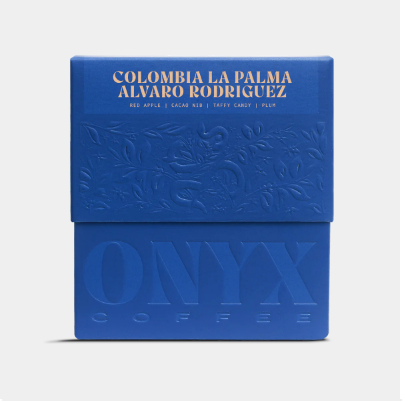
About this Coffee
This lactic-processed micro-lot from our friends at La Palma Y El Tucan boasts a layered complexity in the cup. After years of honing this process, the hard work at the wet mill yields a sweetness like apple and plum, with complex tones of cacao nib from the pushed fermentation.
Cundinamarca, Colombia. As far as coffee growing regions are concerned, the region of Cundinamarca has been under-represented for some time. It rarely shows up within the list of coffee growing regions in Colombia, referred to as the axis region. We often gravitate towards Cundinamarca and the work done there by Equation Coffee, finding diverse cup profiles across the many producers we work with in the region. This micro-lot grown by Alvaro Rodriguez was processed and picked through the Neighbors and Crops program. With some small-holder producers like Alvaro the program is helpful in providing agronomical support and picking services. Producers within the program often operate in a hybrid model, selling coffee to the local market while also selling cherry to La Palma Y El Tucan, which provides diversity cash flow, as well as an avenue to receive premiums well above the commodity market prices they receive at collection stations.
LACTIC PROCESSING
Time, temperature, pH, and Brix all play into this unique processing method. A common misconception is that this method is processed using the addition of lactobacillus, a yeast strain, or by the addition of Lactic acid. The real process is a nuanced limited oxygen pre-fermentation in a sealed tank, allowing the bacteria and yeast to consume the mucilage within the cherry, producing lactic acid and therefore changing the final cup profile. After the fermentation, this coffee is depulped and dried on raised parabolic beds where dry heat is pumped in to aid the drying process during the cold and humid nights.
LA PALMA Y EL TUCÁN
La Palma y El Tucán. The name has become synonymous with high-quality competition-grade coffees, but for our green buyer, it means another thing: home. Dakota spent three months living in one of the nine cabins built on the grounds of La Palma Y El Tucán, working alongside the team there to facilitate a coffee experience unlike any other for guests visiting the farm. During his time there, he experienced their dedication to quality and the constant innovation taking place in all aspects of the farm. The guidance and teaching from each of La Palma’s staff members were integral to leading Dakota to the Onyx team, who has had a relationship with La Palma y El Tucán since early 2013.
Felipe and Elisa started La Palma y El Tucán with the vision to produce small, perfect quantities of some of the world’s favorite coffee varieties. The farm has a unique layout with each variety planted in an artful way that encourages exceptional production and is also beautiful. The coffee is picked as it ripens by a team of women whose job it is to choose only the best cherries, making pass after pass, day after day. La Palma’s farming practices and their wet mill is designed to showcase how fermentation can encourage coffees to create flavors you could only dream of.
In the last few years, they’ve started a project called Neighbors & Crops, a program that consists of buying coffee from the surrounding farms and processing it in their state-of-the-art mill. By teaching agronomy, cherry selection, and giving organic fertilizer to neighbors, they have lifted both the quality of life and quality of coffee in their region. This coffee is the product of that partnership.